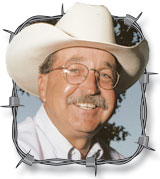It’s funny how one little job can bring back a flood of memories from more than 50 years ago. But, that was the case last week as I used a four-wheel drive tractor (with a cab) to clean up the manure mess made by a winter’s worth of feeding five bulls. Neither the chilly wind nor dusty conditions bothered me as I created a pile of waste that will eventually rot down and become great garden fertilizer. The 30-minute chore was a far cry from the annual week-long activity of a half-century earlier.
On the family farm of my younger years, we fed our entire dairy and beef herd (about 40 head) from a hay manger that ran the entire length of our sizeable barn. One can only imagine how much manure was produced by that number of animals over the course of an entire winter. Dad would clean out the shed a couple of times during the winter and create huge piles on the north side of the building that would become the majority of our fertilizer by April. I can still hear him saying, “Every acre where we can spread manure, is one less acre needing bought fertilizer.” And…we spread manure on a bunch of acres.
When winter hay-feeding was over, my father would attach the front-end loader to his tiny Ford 8N tractor, put weights on the rear wheels to give it a little more traction, and grease up the ancient mechanical manure spreader for the job at hand. While he operated the tractor, I was on the business end of a manure fork picking up chunks that fell off the loader and hand delivering them to the spreader. Once the spreader was full, we would hook it up to the tractor and I was off to spread the load on the fields while dad stayed behind to use the hand fork to clean out areas the tractor couldn’t reach. Although driving the tractor was easier than digging with a hand fork, the lumps of old manure that hit me in the back of the head as I unloaded were likely significant contributors to my present-day not-so-great intellect.
It would usually take about a week to complete the entire chore and the barn would once again be in that pristine condition my father demanded. I, on the other hand, would reek of manure for another two to three weeks after finishing the project. Our fields would benefit greatly from the addition of the manure and we usually had to spend very little for commercial fertilizer other than lime. “That’s the way you save money and stand a chance to make some money from farming,” my dad would always conclude.
Today, all my hay (except what is placed in feeders for the bulls) is unrolled from behind the truck in a different location every day. By using that method, the cows themselves perform the task of spreading the manure across the fields. My old manure spreader sits in the corner of a shed, rusting away into oblivion.
I was visiting with a neighbor the same afternoon that I had made my yearly pile of garden compost and we both laughed at how much work it used to be. “Look at us,” he commented, “I don’t spread manure anymore and you get paid to do it every week.”






